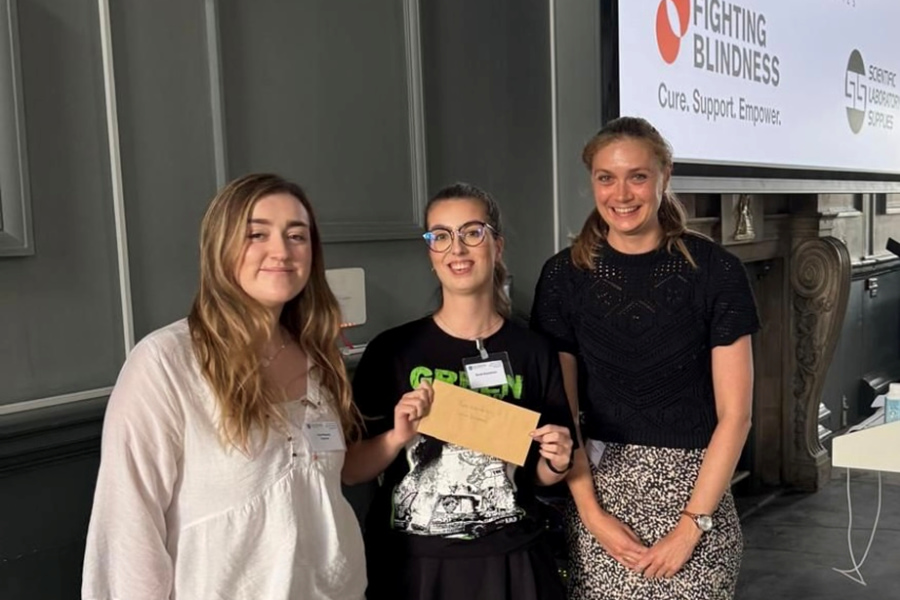.jpg)
Sarah Boardman is a PhD student in the Department of Clinical Infection, Microbiology and Immunology. She recently attended the Blood-Brain Barrier Symposium at Trinity College in Dublin and told us about her experience.
I am a 3rd year PhD student in the Brain Infection and Inflammation Group, led by Professor Benedict Michael, and my research focuses on the blood-brain barrier.
In early July, I had the opportunity to attend the Blood-Brain Barrier Symposium at Trinity College in Dublin. As a PhD student researching the blood-brain barrier, this was a great chance to connect with fellow researchers and learn about the latest developments in the field.
Stepping outside the comfort zone
After submitting an abstract, I was selected to give a platform talk – a 10-minute presentation followed by 5 minutes of questions. This would be my first long-form presentation of my research, my first international conference, and my first time traveling abroad alone, so I felt a mix of excitement and nervousness. Despite my nerves, I was determined to push myself and make the most of the experience. To help cover the travel costs, I applied for the IVES PGR Small Grant Award and was gratefully awarded £300, which covered my flights and part of my hotel stay.
My travel went smoothly, and everyone I met was so helpful. The day before the conference, I walked from my hotel to Trinity College to make sure I knew my way around. This helped to reduce the stress of being in a new environment and gave me a chance to explore the city. I also ran through my PowerPoint presentation several times to ensure I felt confident with the flow and my talking points.
My presentation was scheduled for the very first session, which meant I didn’t have long to wait. I arrived early and went through my slides once more. Despite all the preparation I was still extremely nervous about presenting in front of so many experts. But once I started, I got into the flow and felt proud of the work I was sharing. I think every PhD student knows the feeling of imposter syndrome, but I’ve found that the more I challenge myself to do things that make me feel this way, the more confident I become in my own abilities.
The value of questions
After my talk, I was asked many insightful questions - some I hadn’t considered before. This was an extremely beneficial part of my experience, as it gave me new ideas for future research and potential reasons why certain parts of my project might not have worked as I expected. During the coffee break that followed, I received many lovely comments on my presentation and work. I had great conversations with other researchers who offered valuable advice and thoughts about my results. Their feedback is now helping me to direct some of the final experiments for my data collection.
The other talks were very interesting, and I found myself asking many questions. At previous conferences I’ve attended, I haven’t often asked questions, but this time the topics were so specific to my work I felt more engaged. It was a great moment of self-reflection; after 3 years of my PhD, I’m starting to develop the type of critical thinking and questioning that experienced researchers, like my supervisor, possess. At the end of the day, prizes were awarded, and I was honoured to receive the prize for the best question asked. This recognition was a great boost to my self-confidence.

Photo of Sarah receiving her prize for the best question asked at the conference.
Building connections
The conference ended with a social event, which I really enjoyed. It was a great opportunity to continue conversations and connect with other attendees, especially fellow students and early-career researchers. It was encouraging to talk to those at a similar stage in their careers, who shared valuable insights and could relate to my experiences.
Overall, I gained a great deal from this conference. The organisers did an excellent job making younger researchers feel welcomed and included. I was able to improve many skills, as well as build many new connections. This experience has massively benefited both me and my research. I’m extremely grateful to IVES for providing the funding that made it possible for me to attend.
My key advice for PhD students:
- Continuously push yourself out of your comfort zone. Each time you will gain more confidence.
- Believe in yourself. You are the expert in your work.
- Talk to as many people as possible. Most people are friendly and happy to give advice, and you might even help someone else in the process.
- Apply for small grants. Funding opportunities, like the IVES PGR small grant award, can make a huge difference in your development as a researcher.